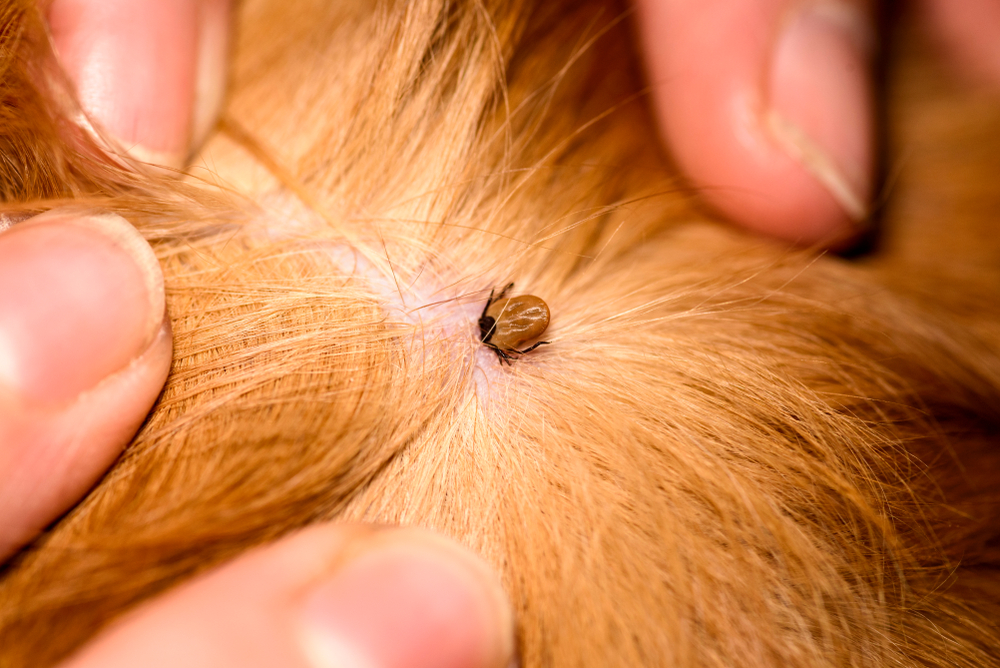Although sometimes you cannot imagine that anything could survive a northeast winter, life always finds a way.
Unfortunately, we’re referring to fleas, ticks, mosquitoes, and intestinal parasites. These pests aren’t turned off when you turn the calendar page. Instead, they may go dormant, over-winter in your basement, or worse—find a cozy home on your pet.
The shifting climate has made the once-seasonal battle against external parasites an endless war. Fight back with a year-round parasite prevention strategy for your pet from Burlington Veterinary Center.
Tiny parasites are a big problem for pets and people
Parasites are more than a nuisance—they can transmit harmful diseases, cause allergic reactions, and infest your home. Many parasitic diseases can also be transmitted to people (i.e., zoonotic diseases), especially children, the elderly, and immunocompromised populations.
Fleas and your pet
Fleas are a familiar foe for many pet owners. The splinter-sized nemesis isn’t restricted by seasonal changes because the pest lives happily—and prolifically—indoors. The flea feeds on blood, and its irritating bite causes intense itching, irritation, and discomfort. Some pets have a severe allergic reaction to a protein in flea saliva (i.e., flea allergic dermatitis [FAD]). Fleas can cause tapeworm infections and feline haemobartonellosis (i.e., a red blood cell infection in cats).
After hitching a ride on your pet, adult females feed, mate, and lay 20 to 50 eggs per day. The eggs fall off wherever your pet rests, pass through a larval and pupal stage, molt into adult fleas, and then return to the pet to bite and feed. The flea population, once the life cycle has been established, can be difficult to completely eradicate. By the time you notice an adult flea or flea dirt (i.e., feces) on your pet, the parasites have been in your home for one to two months.
Ticks and your pet
Ticks are hard-bodied arachnids that live predominantly in tall grasses and wooded areas, and must bite and feed on multiple wildlife hosts during their development. From these hosts, ticks obtain infectious diseases, including Lyme disease, Rocky Mountain spotted fever, anaplasmosis, and ehrlichiosis.
Ticks are most active during early spring and fall, but several species can withstand above-freezing temperatures. All tick species can also re-emerge on mild winter days in search of their next meal, which may be you or your pet.
Mosquitoes and your pet
Mosquitoes carrying Dirofilaria immitis can transmit deadly heartworm disease to dogs and cats in a single bite. The microscopic parasite enters the bite wound on your pet, and then begins a six-month journey to the heart and large lung vessels, where mature 6- to 12-inch-long worms cause cardiovascular irritation, inflammation, and deadly blockages.
Once the mature heartworms reproduce, the infected dog or cat becomes a disease reservoir, and increases the infection risk for other pets in the area. Heartworm treatment in dogs is expensive, painful, and dangerous, and no current treatment exists for heartworm-positive cats.
Although mosquito populations are significantly reduced during cold weather, some may overwinter in garages, basements, or other protected areas, and re-emerge on mild days, making heartworm disease a year-round threat.
Intestinal parasites and your pet
Most intestinal parasites are transmitted by eating infected soil or stool, drinking contaminated water, or mutual grooming. Puppies and kittens may be exposed to roundworms and hookworms while in utero or through their mother’s milk, and therefore should be dewormed regularly. While most intestinal parasites cause only mild gastrointestinal signs in adult pets, heavy infestations can be dangerous or deadly to puppies and kittens. Some intestinal parasites are transmissible to people, especially the vulnerable populations.
Dogs and cats may shed infective parasite eggs in their stool while they are infected, and may show no visible illness signs. Many parasite eggs can live in the soil for years, making year-round infections possible. Most heartworm preventives contain a broad-spectrum dewormer that ensures your pet also is protected monthly from common intestinal parasites.
Parasite prevention strategies for pets

As you can see, parasites don’t take a holiday. Unfortunately, many owners pause their pet’s prevention plan during the winter months—but that leaves pets vulnerable to infection. Plus, owners may not remember to resume the plan when the weather warms up.
Administering parasite preventives year-round is the best and easiest way to ensure your pet has effective, uninterrupted protection. For a comprehensive protection plan, Burlington Veterinary Center recommendations include:
- Heartworm prevention — Monthly oral or topical products typically contain a broad spectrum dewormer for comprehensive coverage.
- Flea and tick prevention — Topical or oral formulas provide 30 to 90 days of protection. Always check your pet thoroughly after visiting a common tick habitat.
- Annual screening tests — We use a small blood sample to test your pet for heartworm and tick-borne diseases, and a fecal parasite screening to check your pet’s stool for microscopic parasite eggs.
- Environmental management — Remove pet waste as soon as possible, and dispose properly. Maintain good hygiene practices around pets, and keep your yard and pet area free from standing water, tall grasses, and overgrown brush, to discourage mosquitoes and ticks.
If your pet’s prevention plan was put on hold, or you’ve missed a few doses, contact Burlington Veterinary Center. Heartworm testing may be necessary to ensure your pet’s health before resuming preventives. If your pet is not on a parasite prevention plan, we’re happy to recommend safe and effective products that will suit your pet’s needs and your preferences.







Leave A Comment